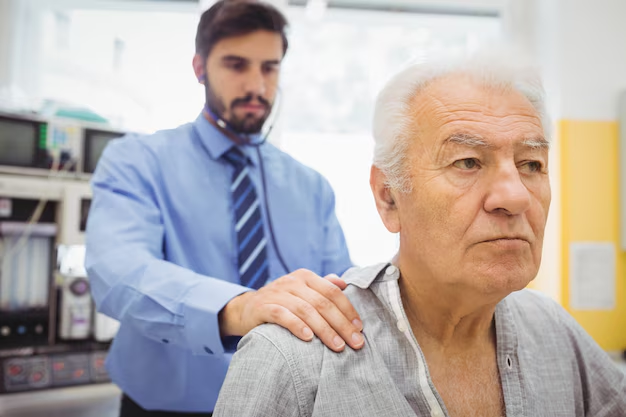Your Guide to How To Tell If You Have Parkinson's
What You Get:
Free Guide
Free, helpful information about Parkinsons FAQ and related How To Tell If You Have Parkinson's topics.
Helpful Information
Get clear and easy-to-understand details about How To Tell If You Have Parkinson's topics and resources.
Personalized Offers
Answer a few optional questions to receive offers or information related to Parkinsons FAQ. The survey is optional and not required to access your free guide.
Recognizing Parkinson's: Key Symptoms to Watch For
Identifying Parkinson's Disease early can make a significant difference in managing its progression and maintaining quality of life. This neurological condition affects movement and is characterized by a combination of symptoms that typically worsen over time. If you're concerned that you or a loved one might have Parkinson's, understanding the early warning signs is crucial.
Common Symptoms of Parkinson's Disease
Tremors: Often the first noticeable symptom, tremors typically start in the fingers, hands, or chin, occurring even when the muscles are relaxed. While not everyone with tremors has Parkinson’s, this symptom is a hallmark sign of the condition.
Bradykinesia: This term refers to slowness of movement, making everyday tasks cumbersome. You might notice difficulties in coordinating movements, such as trouble fastening buttons or increased time to perform daily activities.
Muscle Stiffness: Rigidity or stiffness in muscles that do not ease up, even after movement, is another sign of Parkinson's. This stiffness might lead to a decreased range of motion and pain in the affected muscles.
Postural Instability: A tendency to fall backward or experience balance issues can indicate Parkinson’s. However, this symptom generally appears later as the disease advances.
Changes in Speech: Many with Parkinson’s experience softer, more monotone speech. Some might also notice a slurred or hesitant speech pattern.
Micrographia: This is the medical term for handwriting changes where writing becomes smaller and crowded. If you observe a noticeable shift in how you or someone you know writes, it might be worth discussing with a healthcare professional.
When to Seek Professional Help
If you recognize these symptoms, it is important to consult with a neurologist, who can perform a comprehensive assessment. They might conduct a physical examination and recommend imaging tests, although a straightforward diagnostic test for Parkinson's is not yet available. Early diagnosis can lead to better management strategies through medication, therapy, and lifestyle changes.
Additional Support and Resources
Living with Parkinson’s involves not just medical intervention but also a supportive community and available resources that can significantly ease the journey.
Financial and Educational Opportunities
Exploring financial and educational resources can empower individuals affected by Parkinson's, helping them to access necessary care and enhance their well-being:
Federal Aid Programs: Programs such as Social Security Disability Insurance (SSDI) may provide monetary support if you are unable to work.
Medicare and Medicaid: These programs offer coverage for medical expenses related to Parkinson's treatments and therapies.
Nonprofit Organizations: Groups like the Parkinson’s Foundation or Michael J. Fox Foundation offer educational resources, support groups, and sometimes financial assistance.
Local Community Services: Many localities have resources offering transportation for medical visits or community health programs designed to assist those with chronic illnesses.
Financial Resources Checklist
- 🏦 SSDI: Check eligibility for disability benefits.
- 🏥 Medicare/Medicaid: Review available healthcare coverage.
- 💼 Nonprofit Support: Investigate Parkinson’s-specific organizations.
- 🚗 Community Services: Utilize local transportation for appointments.
By recognizing the symptoms early, seeking professional evaluation, and utilizing available resources, those with Parkinson's can take proactive steps to improve their quality of life. Remember, you are not alone—community and resources are here to support you.
What You Get:
Free Parkinsons FAQ Guide
Free, helpful information about How To Tell If You Have Parkinson's and related resources.

Helpful Information
Get clear, easy-to-understand details about How To Tell If You Have Parkinson's topics.

Optional Personalized Offers
Answer a few optional questions to see offers or information related to Parkinsons FAQ. Participation is not required to get your free guide.


Discover More
- Are There Environmental Causes Of Parkinsons
- Can Alcohol Cause Parkinson's
- Can Concussions Cause Parkinson's
- Can Concussions Cause Parkinson's Disease
- Can Dogs Get Parkinson's Disease
- Can Dogs Get Parkinsons
- Can Dogs Have Parkinson's
- Can Dogs Have Parkinson's Disease
- Can Females Get Parkinson Disease
- Can Head Trauma Cause Parkinson's
